-
REVIEW09-29-2022
Palliative care in Primary Health Care: an integrative literature review
Revista Brasileira de Enfermagem. 2022;75(1):e20201335
Abstract
REVIEWPalliative care in Primary Health Care: an integrative literature review
Revista Brasileira de Enfermagem. 2022;75(1):e20201335
DOI 10.1590/0034-7167-2020-1335
Views0See moreABSTRACT
Objectives:
to analyze scientific evidence on the implementation and performance of palliative care in Primary Health Care.
Methods:
an integrative literature review, according to the Preferred Reporting Items for Systematic Reviews and Meta-Analyses, carried out in the PubMed, SciVerse Scopus and LILACS databases, in December 2020, without a time frame.
Results:
22 original scientific articles were analyzed, 14 classified as evidence level VI. The objective was to understand the experiences and roles of professionals, patients and families on palliative care in Primary Health Care, articles focused on the theme of management and organization of health services and on the importance of educational interventions on the subject.
Final Considerations:
evidence found relating palliative care in Primary Health Care points to the possibility of this care; health teams work closely with the family and their home, but the need to expand this theme is still perceived.

-
REVIEW09-29-2022
Children with congenital heart disease in COVID-19 pandemic times: an integrative review
Revista Brasileira de Enfermagem. 2022;75(1):e20201033
Abstract
REVIEWChildren with congenital heart disease in COVID-19 pandemic times: an integrative review
Revista Brasileira de Enfermagem. 2022;75(1):e20201033
DOI 10.1590/0034-7167-2020-1033
Views0See moreABSTRACT
Objective:
to identify the scientific production in health about children with congenital heart disease in COVID-19 pandemic times.
Method:
this is an integrative review, carried out in June 2020 in the information resources Latin American and Caribbean Literature in Health Sciences (LILACS), National Library of Medicine, National Institutes of Health (PubMed), Scientific Electronic Library Online Journal Portal (SciELO) and Brazilian Institute of Information Science and Technology (Oasis Ibict).
Results:
14 studies composed this review. Most studies pointed to tests, interventional procedures and surgery for children with heart disease in pandemic times; others discussed possible complications of COVID-19 among children with congenital heart disease.
Conclusion:
the incipient production of studies and the weak level of evidence denote an important knowledge gap so far, highlighting the need for studies with strong scientific evidence for the formulation of care guidelines aimed at children with heart disease.
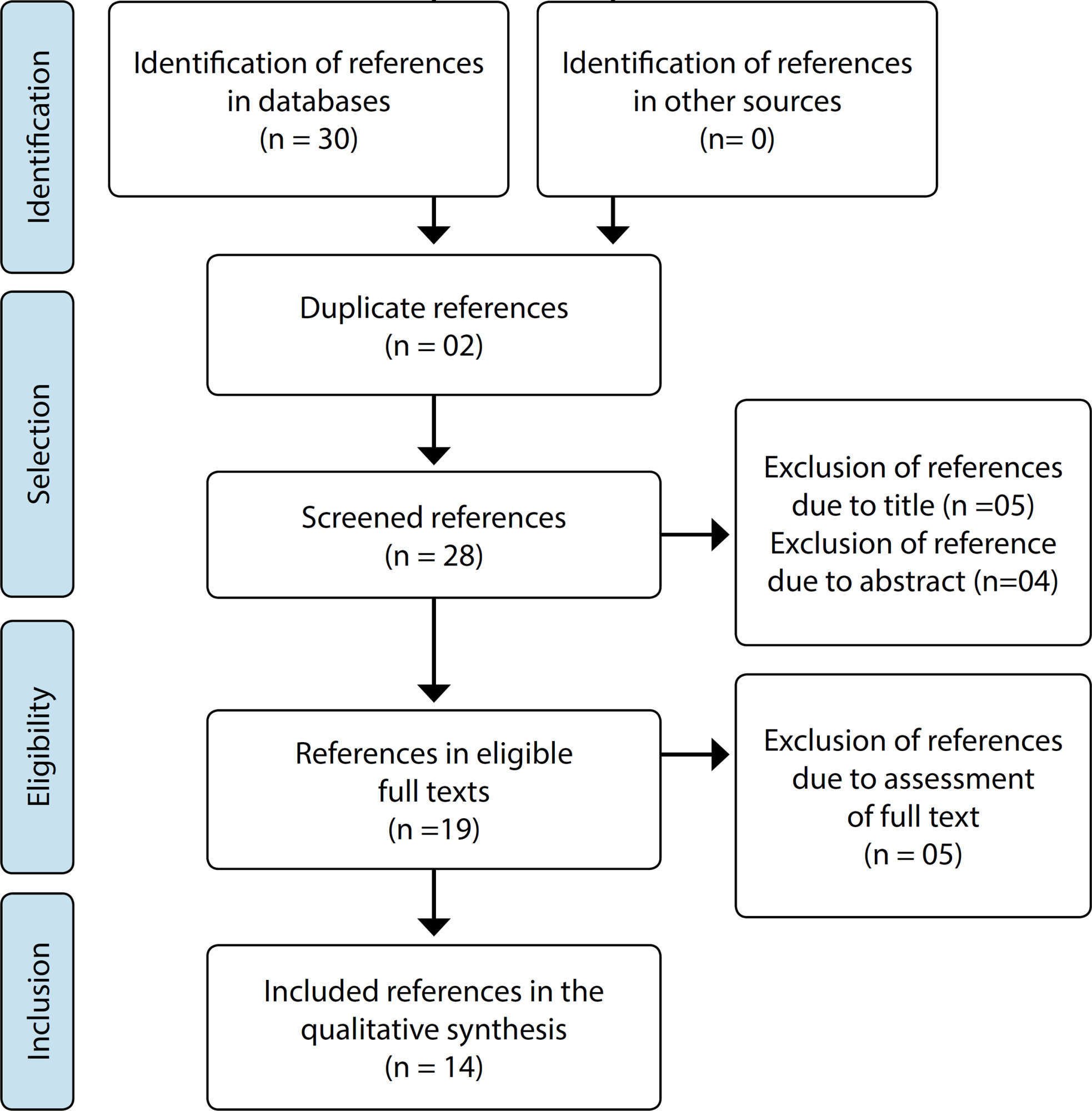
-
ORIGINAL ARTICLE09-29-2022
Palliative care production for health professionals in the context of home care
Revista Brasileira de Enfermagem. 2022;75(1):e20210030
Abstract
ORIGINAL ARTICLEPalliative care production for health professionals in the context of home care
Revista Brasileira de Enfermagem. 2022;75(1):e20210030
DOI 10.1590/0034-7167-2021-0030
Views1See moreABSTRACT
Objectives:
to analyze palliative care production developed by health professionals to home care patients.
Methods:
this is an exploratory study, with a qualitative approach, using the transpersonal care theoretical framework. Thirteen interviews were conducted with health professionals and 18 observations were conducted on different cases. Content analysis was performed using MAXQDA©.
Results:
actions performed: maintenance and follow-up measures to people eligible for palliative care, in acts of dialogue and “listening” to caregivers and users, conducting guidelines for the care and self-care process, performing technical procedures, delivery of materials, referrals and medical prescriptions to users.
Final Considerations:
it is perceived the need for advances in the implementation of government policies in Brazil that insert palliative care into the Health Care Network through educational, managerial and care actions that ensure human dignity, thus allowing the development of these and other palliative care interventions.
-
ORIGINAL ARTICLE09-29-2022
Incidence of acute radiodermatitis in women with breast cancer undergoing hypofractionated radiotherapy
Revista Brasileira de Enfermagem. 2022;75(1):e20210118
Abstract
ORIGINAL ARTICLEIncidence of acute radiodermatitis in women with breast cancer undergoing hypofractionated radiotherapy
Revista Brasileira de Enfermagem. 2022;75(1):e20210118
DOI 10.1590/0034-7167-2021-0118
Views0See moreABSTRACT
Objective:
To estimate the incidence and degree of acute radiodermatitis at the end and after the end of treatment in women with breast cancer undergoing hypofractionated radiotherapy.
Methods:
Observational, prospective, and longitudinal study, conducted between March 2019 and January 2020, in a radiotherapy outpatient clinic.
Results:
Thirty-two women participated in the study, among whom, in the last session of hypofractionated radiotherapy, 15 (46.9%) had radiodermatitis, erythema in 13 (40.6%), and wet peeling in 2 (6.3%). In the post-treatment evaluation, 27 (84.4%) had radiodermatitis, erythema in 17 (53.1%), dry peeling in 8 (25%), and wet peeling in 2 (6.3%).
Conclusion:
The general incidence of radiodermatitis after hypofractionated radiotherapy in women with breast cancer was 37.5%, erythema, 12.5%, and dry peeling, 25%. The development of care protocols for the management of radiodermatitis after treatment is of paramount importance.
-
ORIGINAL ARTICLE09-29-2022
Neither angels nor heroes: nurse speeches during the COVID-19 pandemic from a Foucauldian perspective
Revista Brasileira de Enfermagem. 2022;75:e20201329
Abstract
ORIGINAL ARTICLENeither angels nor heroes: nurse speeches during the COVID-19 pandemic from a Foucauldian perspective
Revista Brasileira de Enfermagem. 2022;75:e20201329
DOI 10.1590/0034-7167-2020-1329
Views1See moreABSTRACT
Objective:
to analyze the processes of meaning production, based on the speeches of nursing professionals, about how they feel about the titles of “angels and heroes” given by society during the pandemic of COVID-19.
Methods:
a qualitative, documentary research. Data was collected in October and November 2020 and analyzed from the perspective of the Discourse Analysis proposed by Michel Foucault.
Results:
they were organized into two thematic categories: “Angels and heroes? The (not) heroic reality of nursing during the pandemic” and “The search for recognition of the professional work of nursing: between what is said and what is not said”.
Final considerations:
the nurses’ speeches enunciate the search for decent conditions for the execution of care, fair wages, and recognition of the professional work by society.
-
EXPERIENCE REPORT09-29-2022
Mobile pre-hospital care reorganization during the COVID-19 pandemic: experience report
Revista Brasileira de Enfermagem. 2022;75:e20200826
Abstract
EXPERIENCE REPORTMobile pre-hospital care reorganization during the COVID-19 pandemic: experience report
Revista Brasileira de Enfermagem. 2022;75:e20200826
DOI 10.1590/0034-7167-2020-0826
Views0See moreABSTRACT
Objective:
To describe the reorganization of Belo Horizonte’s Mobile Emergency Care Service during the new coronavirus pandemic using the Plan Do-Check-Act quality tool.
Methods:
Descriptive study, of the experience report type, on the reorganization of care in a mobile pre-hospital care service during the new coronavirus pandemic, from March to July 2020. The Plan-Do-Check-Act quality tool was applied for the process.
Results:
Preparation of care protocol, meetings, training, addition of ambulances, hiring of professionals, and other actions were carried out, with subsequent evaluation and monitoring. When failures or new needs were identified, actions and changes were implemented while keeping monitoring and evaluation during the work routine.
Final considerations:
The reorganization of the service through the construction of a protocol and using the Plan-Do-Check-Act as a management tool was essential to promote safe care for professionals and patients.

-
REFLECTION09-29-2022
Health care of deaf persons during coronavirus pandemics
Revista Brasileira de Enfermagem. 2022;75:e20201036
Abstract
REFLECTIONHealth care of deaf persons during coronavirus pandemics
Revista Brasileira de Enfermagem. 2022;75:e20201036
DOI 10.1590/0034-7167-2020-1036
Views0See moreABSTRACT
Objective:
To reflect about the barriers experienced by the deaf population during the COVID-19 pandemic, the proposals to overcome communication barriers in health care and the role of public policies in effecting the social inclusion of deaf people.
Methods:
Reflection based on studies on health care for deaf people, the COVID-19 pandemic and public accessibility policies.
Results:
The global crisis of COVID-19 has deepened pre-existing inequalities in the world, in addition to highlighting the vulnerability of people with disabilities, including deaf. Government, institutional and social initiatives to mitigate difficulties in communicating to deaf people have been made, but they are still insufficient to guarantee protection for them in this pandemic and full inclusion in health care.
Final considerations:
Social inclusion, supported by law, and the linguistic accessibility of deaf people still need to generate broad and concrete actions so that deaf people can enjoy their rights as citizens.
-
REFLECTION09-29-2022
Hemodialysis in the context of COVID-19: care, nursing protagonism and quality
Revista Brasileira de Enfermagem. 2022;75:e20201077
Abstract
REFLECTIONHemodialysis in the context of COVID-19: care, nursing protagonism and quality
Revista Brasileira de Enfermagem. 2022;75:e20201077
DOI 10.1590/0034-7167-2020-1077
Views0See moreABSTRACT
Objective:
To reflect on the need to reorganize satellite dialysis units to ensure the safety of patients and workers, focusing on minimizing the risk of contamination by SARS-CoV-2.
Methods:
Reflection considering the guidelines of international and Brazilian institutions and scientific articles, with a view to possible adaptations to the Brazilian reality.
Results:
The actions suggested and adapted by Dialysis Units from different countries during the pandemic focus on the quality of care and safety of the patient and workers. There was an opportunity to reflect on these actions using the Donabedian Model for quality of care and highlight the nursing team’s role in this context.
Final considerations:
The focus on quality and safety related to institutionalized processes and the assessment through indicators can contribute to the management of the outpatient dialysis unit in the context of COVID 19.
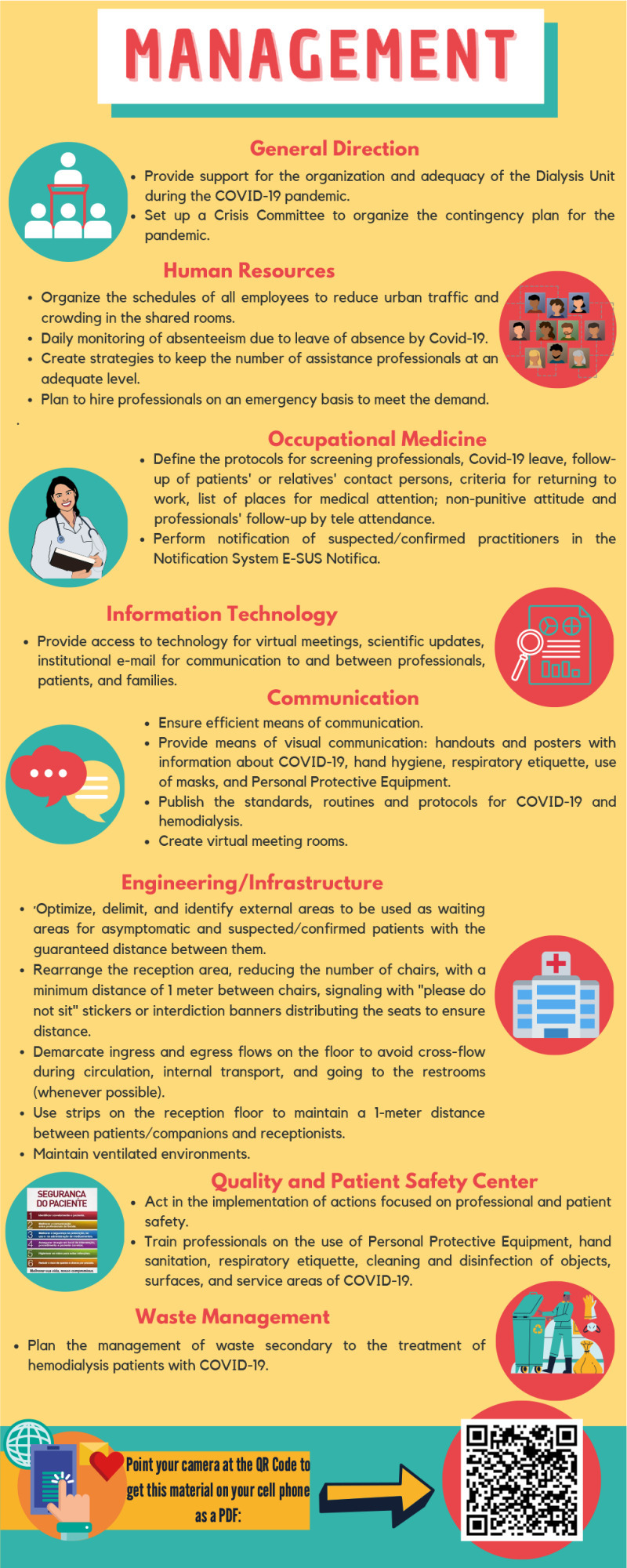
-
ORIGINAL ARTICLE02-10-2020
Stress and health risk behaviors among university students
Revista Brasileira de Enfermagem. 2020;73(1):e20180035
Abstract
ORIGINAL ARTICLEStress and health risk behaviors among university students
Revista Brasileira de Enfermagem. 2020;73(1):e20180035
DOI 10.1590/0034-7167-2018-0035
Views0See moreABSTRACT
Objective:
To analyze the level of stress and its relationship with health risk behaviors among university students.
Method:
Cross-sectional analytical study carried out at a higher education institution in Picos-PI. A total of 377 students were evaluated for socio-demographic and academic variables, stress profile, sleep quality, alcohol use, smoking habits and level of physical activity. The Statistical Package for the Social Sciences (SPSS), version 20.0 was used for data processing and analysis.
Results:
Sleep quality was poor for 65.3% of the subjects, and sleep disturbances were found in 17.0%. Stress was observed in 68.7% of the sample. Stress was associated with the following variables: gender, time in the institution, poor sleep quality.
Conclusion:
Most of the students evaluated present some level of stress associated with poor sleep quality, which is a risk to the quality of life of these individuals.
-
09-16-2019
Construct validation: coping with HIV/AIDS in Primary Health Care
Revista Brasileira de Enfermagem. 2019;72(5):1173-1181
Abstract
Construct validation: coping with HIV/AIDS in Primary Health Care
Revista Brasileira de Enfermagem. 2019;72(5):1173-1181
DOI 10.1590/0034-7167-2018-0734
Views0See moreABSTRACT
Objective:
To validate the construct and measure the trustworthiness of a questionnaire aimed at assessing HIV/AIDS coping actions developed by health professionals in Primary Health Care.
Method:
A methodological study carried out with 397 primary health care professionals in two municipalities in the Northeast region of Brazil. The construct validity was developed by the exploratory and confirmatory factor analysis, and the reliability analyzed by the reliability and reproducibility.
Results:
The validation determined six factors retention that composed the six domains of the questionnaire. Internal consistency was 0.91 and quality of the confirmatory analysis adjustment was 0.998 for Goodness of Fit Index. The domains presented Kappa values between 0.833 and 0.997.
Conclusions:
The final questionnaire was composed of 18 items and presented feasibility of application, and potential to evaluate actions for HIV/AIDS control in Primary Health Care.
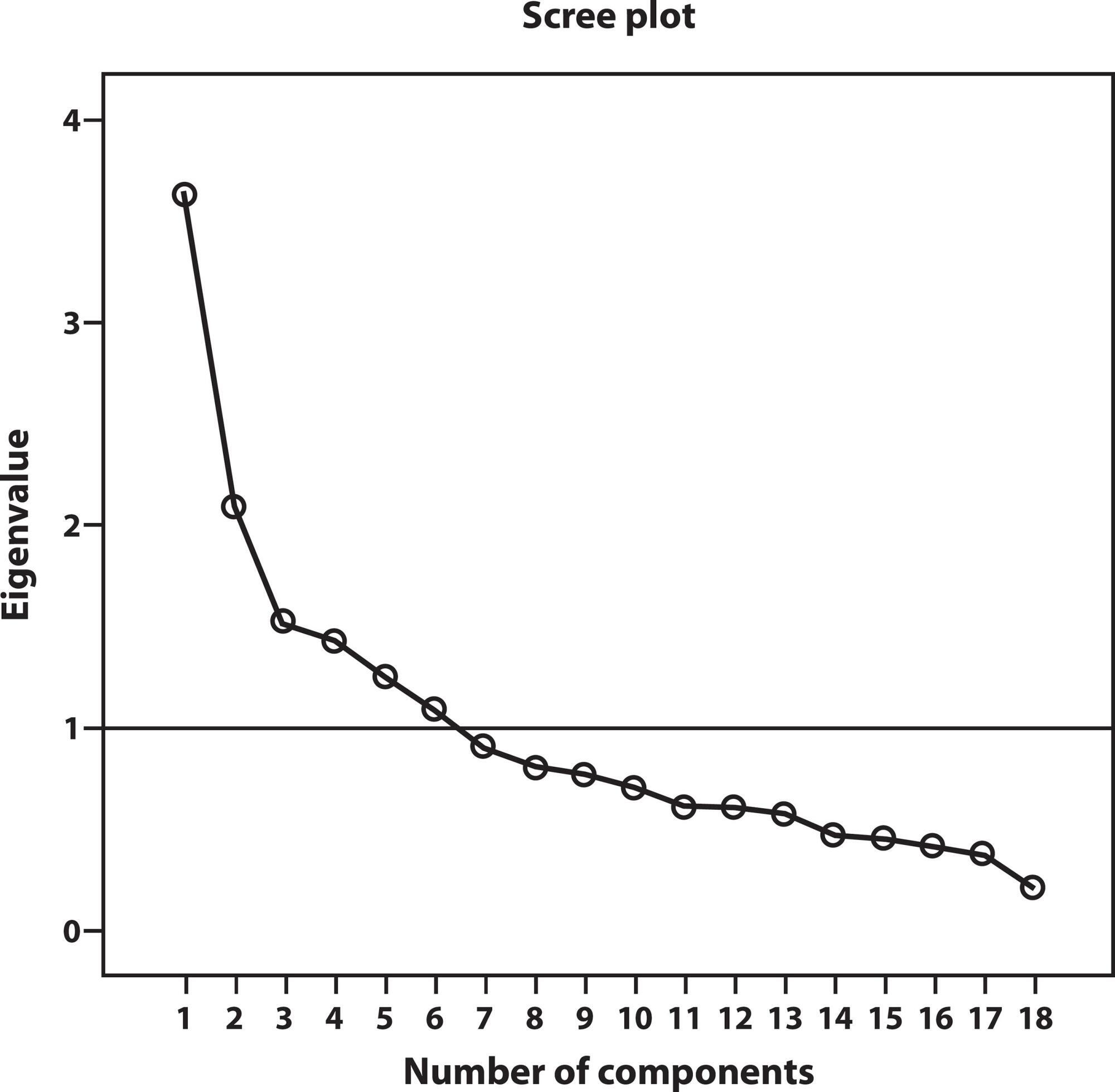
-
ORIGINAL ARTICLE11-12-2022
Low-laser light therapy in venous ulcer healing: a randomized clinical trial
Revista Brasileira de Enfermagem. 2022;75(3):e20210396
Abstract
ORIGINAL ARTICLELow-laser light therapy in venous ulcer healing: a randomized clinical trial
Revista Brasileira de Enfermagem. 2022;75(3):e20210396
DOI 10.1590/0034-7167-2021-0396
Views0See moreABSTRACT
Objectives:
to compare the effect of adjuvant low-laser light therapy versus conventional treatment alone on venous ulcer healing.
Methods:
this is a randomized clinical trial with 40 patients randomized equally to a control group (topical and compressive treatment) and intervention group (adjuvant low-laser light therapy). Outcomes of interest were Wound Healing: Secondary Intention and Tissue Integrity: Skin & Mucous Membranes, as described in the Classification of Nursing Outcomes/NOC.
Results:
groups with similar sociodemographic and clinical characteristics. Eighty-two ulcers were assessed, with an average duration of 1 to 5 years, in 1,066 nursing consultations, with a statistically significant difference in the time and number of healed ulcers (intervention group). There was a significant improvement in the nursing outcomes under study and in eight clinical indicators.
Conclusions:
low-laser light therapy improves and reduces tissue regeneration time, contributing to advances in wound treatment.
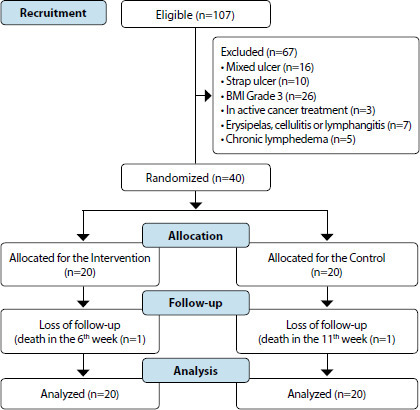
-
05-21-2021
Evolution of nursing teaching in the use of education technology: a scoping review
Revista Brasileira de Enfermagem. 2021;74:e20200422
Abstract
Evolution of nursing teaching in the use of education technology: a scoping review
Revista Brasileira de Enfermagem. 2021;74:e20200422
DOI 10.1590/0034-7167-2020-0422
Views1See moreABSTRACT
Objective:
To identify and map the technological tools of information and communication to support the teaching learning process in Nursing teaching courses.
Methods:
This is a scoping review whose search was carried out in seven databases and in grey literature. After an initial analysis of the selection, 88 texts were read integrally, and 29 made up the final sample.
Results:
Virtual learning environment and object, simulation, hypermedia, and software or cellphone applications were the tools the nursing professors used the most. Studies highlight that the application of technology was important in the teaching-learning process, since it encouraged teaching based on safe care, motivating and developing abilities/competences, supported on significant, effective, flexible, and autonomous learning.
Conclusion:
The contribution of the technology for nursing formation stands out, but it should be highlighted that its employment must be critical, reflective, based on pedagogical theories and developed by trained professors.

-
ORIGINAL ARTICLE09-30-2020
Organizational culture, authentic leadership and quality improvement in Canadian healthcare facilities
Revista Brasileira de Enfermagem. 2020;73:e20190732
Abstract
ORIGINAL ARTICLEOrganizational culture, authentic leadership and quality improvement in Canadian healthcare facilities
Revista Brasileira de Enfermagem. 2020;73:e20190732
DOI 10.1590/0034-7167-2019-0732
Views0See moreABSTRACT
Objective:
To investigate relationships among flexible and hierarchical organizational cultures, quality improvement domains, and authentic leadership competencies in Canadian healthcare facilities.
Method:
Observational cross-sectional study conducted in Alberta, Canada. Nurse managers (n=226) completed a survey including validated measures of organizational culture, quality improvement and authentic leadership. Data were analyzed using descriptive statistics, Spearman’s correlation coefficient and Chi-squared test (p<0.05).
Results:
Quality improvement through accreditation is related to organizational culture and authentic leadership. We saw a propensity for participants who reported working in a more flexible culture also reported greater quality improvement implementation and authentic leadership practices.
Conclusion:
This study assessed and reported the relationships between flexible organizational cultures, quality improvement through the accreditation process, and authentic leadership practices of healthcare managers. Flexible organizational cultures influence the adoption of authentic leadership, participatory management model and also improves quality.
-
ORIGINAL ARTICLE09-16-2019
Temporal trend of leprosy in a region of high endemicity in the Brazilian Northeast
Revista Brasileira de Enfermagem. 2019;72(5):1356-1362
Abstract
ORIGINAL ARTICLETemporal trend of leprosy in a region of high endemicity in the Brazilian Northeast
Revista Brasileira de Enfermagem. 2019;72(5):1356-1362
DOI 10.1590/0034-7167-2018-0682
Views0See moreABSTRACT
Objective:
to analyze the temporal trend and epidemiological patterns of leprosy indicators in Sobral, a municipality countryside of the state of Ceará, from 2001 to 2016.
Method:
a time series study based on data from the Department of Informatics of the Unified Health System. The time trend analysis was performed using the join point regression model.
Results:
There were 2,220 new cases of leprosy in Sobral from 2001 to 2016. Of these, 158 (7.2%) in children younger than 15 years of age, the proportion of new male cases was 52.8% (1,162), cases with grade 2 were 7.0% (156), and proportion of cases diagnosed by contact examination 5.7% (126).
Final considerations:
leprosy remains hyperendemic in adults and children, demonstrating the character of neglected disease. Analysis of the temporal trend allowed to verify that the instability in the detection coefficients, reflect operational problems in the organization of the services
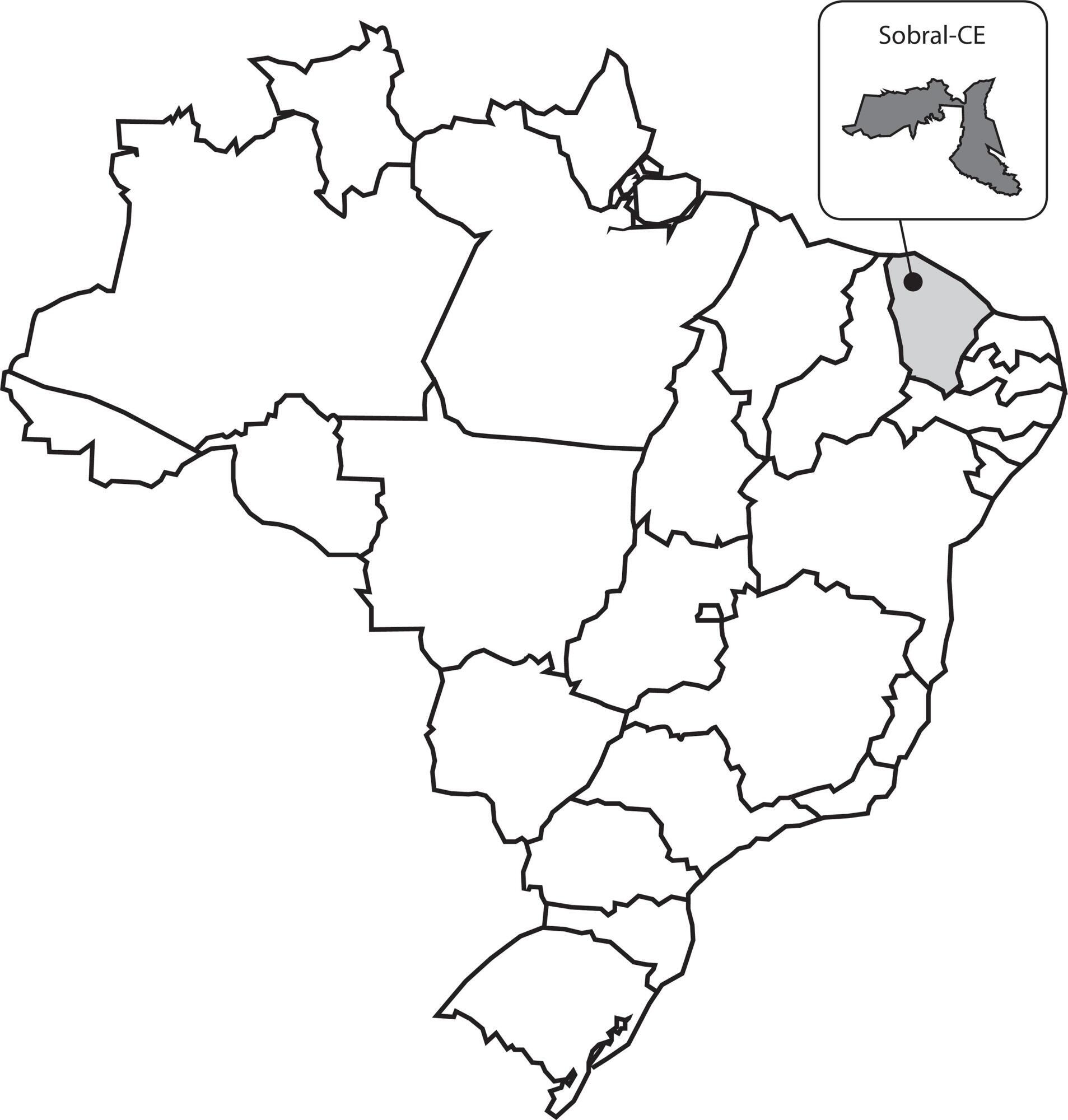
-
ORIGINAL ARTICLE03-07-2022
Adaptation and validation of the Advanced Practice Nursing Competency Assessment Instrument
Revista Brasileira de Enfermagem. 2022;75(5):e20210582
Abstract
ORIGINAL ARTICLEAdaptation and validation of the Advanced Practice Nursing Competency Assessment Instrument
Revista Brasileira de Enfermagem. 2022;75(5):e20210582
DOI 10.1590/0034-7167-2021-0582
Views0See moreABSTRACT
Objective:
To adapt and validate the content of the Advanced Practice Nursing Competency Assessment Instrument (APNCAI) to Brazilian culture.
Methods:
This is a methodological study that followed the stages of translation, synthesis, back translation, evaluation by a committee of five specialists, pre-test with 31 nurses, and evaluation by the author of the original instrument. The Content Validity Index (minimum 0.90) and the modified Kappa (minimum 0.74) were calculated to evaluate the content.
Result:
In the first round of content evaluation, 18 items had to be altered because they did not reach the minimum values established. Three items have not reached a consensus in the second round and had to be sent to the author of the original version. In the pre-test, 13 items were returned to the specialists because they suffered content changes.
Conclusion:
The Advanced Practice Nursing Competency Assessment Instrument (APNCAI) – Brazilian version was cross-culturally adapted, and its content was validated.
-
ORIGINAL ARTICLE08-19-2019
Factors related to impaired comfort in chronic kidney disease patients on hemodialysis
Revista Brasileira de Enfermagem. 2019;72(4):889-895
Abstract
ORIGINAL ARTICLEFactors related to impaired comfort in chronic kidney disease patients on hemodialysis
Revista Brasileira de Enfermagem. 2019;72(4):889-895
DOI 10.1590/0034-7167-2018-0120
Views0See moreABSTRACT
Objective:
to analyze the factors related to the impaired comfort of chronic kidney diseases (CKD) patients on hemodialysis.
Method:
this is a cross-sectional study with 80 patients undergoing hemodialysis in a renal replacement therapy unit through interviews using two instruments, one for clinical and sociodemographic characteristics and the General Comfort Questionnaire, during the hemodialysis session. Mann-Whitney tests and the logistic regression model were used for data analysis.
Results:
the study found that being younger (p=0.045); being married (p=0.05); and absence of impaired physical mobility (p=0.007) were contributing factors for greater comfort in CKD patients on hemodialysis. Thus, when establishing the odds ratio, it was possible to observe that being 55 years of age or older, being single and having impaired physical mobility represents a 45.7% chance of developing this diagnosis.
Conclusions:
sociodemographic and clinical variables contribute to the study outcome, demanding attention during the planning of nursing interventions.
Search
Search in:
Nuvem de Tags
Adolescente (85) Atenção Primária à Saúde (239) COVID-19 (91) Criança (91) Cuidados de Enfermagem (269) Educação em Enfermagem (151) Educação em Saúde (139) Enfermagem (930) Enfermagem Pediátrica (86) Estudantes de Enfermagem (77) Estudos de Validação (131) Família (87) Idoso (208) Promoção da Saúde (99) Qualidade de Vida (104) Saúde do Trabalhador (86) Saúde Mental (145) Saúde Pública (82) Segurança do Paciente (150) Tecnologia Educacional (100)



